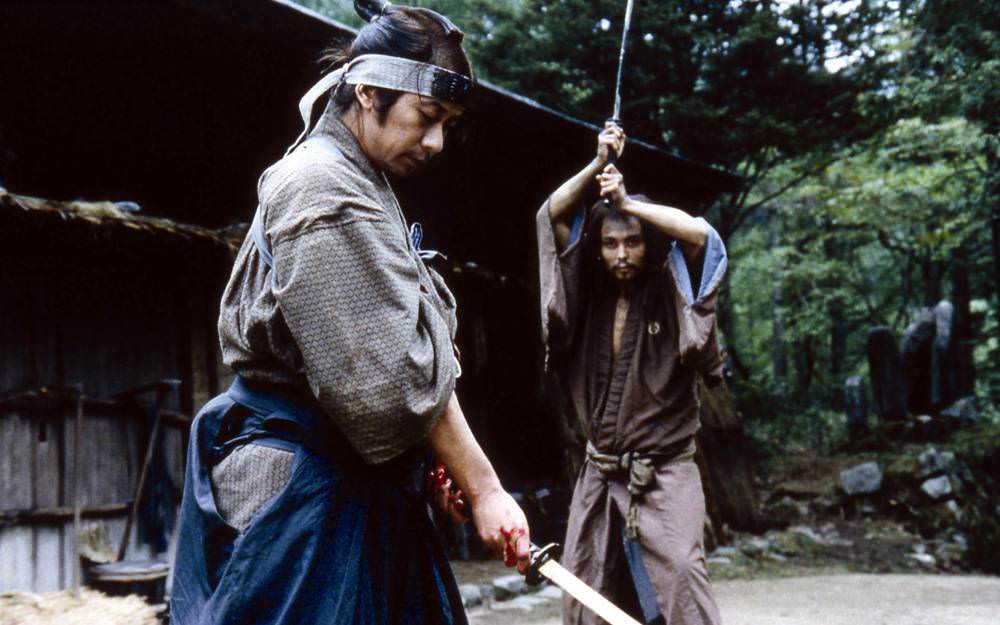The Hidden Blade by Yôji Yamada (Review)

If you’ve seen The Twilight Samurai, there’s a very good chance that watching The Hidden Blade will give you a major feeling of deja vu. The two films are so similar ” in tone, pacing, storyline, and characters ” that I don’t think it’s entirely unjustified to call The Hidden Blade a retread. A skillfully done, artfully made, beautifully rendered retread, but a retread nonetheless.
Katagiri (Masatoshi Nagase) is a low-ranking samurai with seemingly no prospects: he’s stationed in a backwater part of the country; his father had been forced to commit hara-kiri, thus casting a shadow over the entire family; and worst of all, he’s unmarried, an unthinkable position for a man his age. However, Katagiri and his family make do, managing to eke out a happy existence.
Much of this is due to Kie (Takako Matsu), a young servant girl who has been living with them for several years, learning the domestic skills needed to be a good wife. Unfortunately, Kie’s time of service is up, and she’s married off to a merchant family. Katagiri’s sister, Shino, is also married off to one of Katagiri’s best friends, leaving him all alone after their mother’s death.
After three lonely years, Katagiri bumps into Kie while running errands, only she’s no longer the bright, cheerful girl she knew. A hard marriage and a hard life have reduced her to a sickly state. Incensed, Katagiri takes her from her husband’s family and begins nursing her back to health, which inevitably starts some scandalous rumors.
However, the clan has far more pressing matters at hand than one samurai’s supposed indisrections. The film is set at the end of the Edo period in Japanese history, the time when modern warfare ” in the form of cannons and firearms ” came to Japan, thus signalling the end of the samurai. As with The Twilight Samurai, this casts a elegiac, nostalgic atmosphere over the entire movie, and director Yoji Yamada captures it just as beautifully and longingly here as he did with his previous film.
Katagiri and his fellow samurai just can’t quite seem to get a handle on this new technology, and many are resentful, feeling that the use of such things is dishonorable. Naturally, this creates a great deal of unrest, with countless individuals are being charged with treason and subversion. One such person is Hazama, a former acquaintance of Katagiri.
Caught in a scheme to “reform” the Shogunate, Hazama is captured by the clan before the Shogun can find out, and brought home in secret. Forbidden to kill himself and thus keep his honor, he is thrown into a cage where he will spend the rest of his life. However, Hazama just so happens to be the clan’s finest warrior, and quickly makes his escape. Because of Katagiri studied under the same swordmaster as Hazama, he is quickly under suspicion himself. The clan makes him offer ” kill Hazama, and any doubts as to your loyalty will be erased.
Katagiri is, of course, torn. He has grown tired of the clan’s politics, and feels no need to kill Hazama. Plus, he and Kie have grown increasingly closer over time. Although unable to express his feelings, it’s obvious that he has fallen in love with her. Unfortunately, the fact that they are from different castes ” he’s a samurai, she’s a farmer’s daughter ” prevent them from being together. However, he is compelled to obey for that is the way of the samurai, even if it leads to certain death.
By now, the similarities to The Twilight Samurai should be obvious, and while watching it, I was struck at just how similar many of the scenes, lines of dialog, and even acting felt. It’s obvious a formula and setting that Yamada likes, and knows how to work with. Like its predecessor, The Hidden Blade is exquisitely made, right down to the very last detail. There’s an authenticity, a naturalism to this film that makes it very appealing.
Of the two films, The Twilight Samurai is much more compelling and evocative. In fact, if I didn’t know better, I’d say that The Hidden Blade came first and served as a test run. The two movies deal with very similar themes ” unrequited love and a sense of loss at the passing of the samurai ” but The Twilight Samurai delivers more fully and does so more confidently. Such that it feels like the more mature, learned piece of work.
That’s not say The Hidden Blade isn’t worth seeing, because it is. And if it hadn’t come out after a film so similar, and so much better, I’d probably be raving about it the same way that I did with The Twilight Samurai. But it didn’t, and so I can’t.
Having said all that, however, I’d love to see Yamada do yet another samurai film. He seems to have a very lovely and noble insight into the genre, with his focus on characters and drama rather than action, and using action only when necessary to accent the plot. He also brings an amazing amount of realism, such that at times, the films almost seem like documentaries. If he should choose to do another samurai film, though, I hope he takes a slightly different approach for the stories and themes that he deals with.
